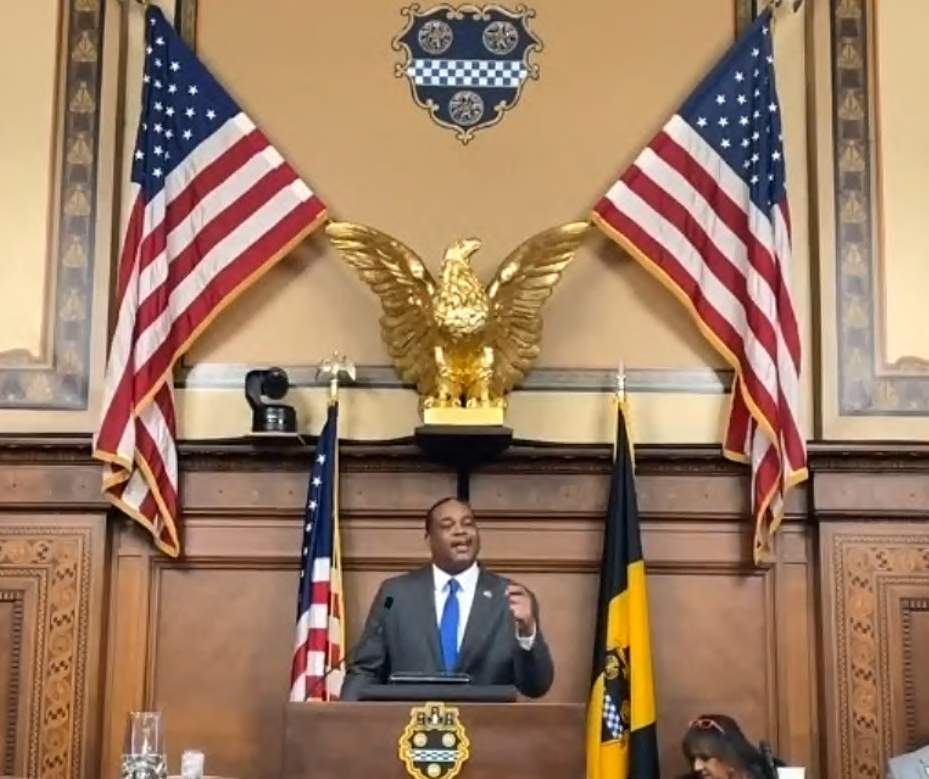In an optimistic soliloquy to Pittsburgh’s power brokers on Monday, Mayor Ed Gainey said the future of the city’s finances may present challenges but will ultimately be “bright” if stakeholders do the hard work.
Gainey, the 53-year-old progressive Democrat who took office at the beginning of 2022, told Pittsburgh’s nine-member council — in an annual budget address — that the city must focus on its next generation of residents and leaders if it wants to be a beacon.
“The state of our city is strong, our future is bright, and our potential is limitless,” Gainey said from the podium in council chambers, recapping his first year in office and looking ahead to the next few years of spending.
The mayor’s proposed budget, sizable and detailed, pitches an overhaul of the city’s staffing and administration. Among the new investments is a 300% increase in bridge maintenance, more than a year since the Fern Hollow Bridge collapse that made headlines across the nation.
Insisting that Pittsburgh is “even stronger than it was a year ago,” Gainey, a former state representative, said he’s proposing no new taxes on city residents but is continuing to ensure that “everyone who should be is paying their fair share to our great city.”
The mayor, who told voters before the 2021 election that he’d scrutinize mega-nonprofits to make sure they’re doing their part, said the city’s law and finance department has challenged the tax-exempt status of 26 properties this year, alleging that they didn’t pass the test of being a “purely public charity.”
Although it’s packed full of administrative changes, Gainey’s budget doesn’t propose any new capital projects. Instead, it focuses on completing projects that are already underway, a “backlog,” the mayor said, that grew in the past decade.
“This is why I have decided to propose a capital budget that does not include any brand new projects in 2024 but instead focuses on filling funding gaps in existing projects to put them on a path to successful and more timely completion,” Gainey told the council.
Gainey said the budget will ultimately move the city closer to his three big goals: to make Pittsburgh the safest city, the most welcoming city and a city in which everyone can thrive.
To meet these goals, Gainey proposed — among other items — doubling investments into community organizations that have proven their effectiveness in addressing harm and trauma. He also pitched increased investments in public safety, including adding 12 community service aides to the police bureau and new vehicles to the emergency fleets.
“We’re taking our first stab at civilianization of some functions in the police bureau in this budget,” Jake Pawlak, Pittsburgh’s deputy mayor and the director of the Office of Management and Budget, told WESA last month. “It’s a small number of positions, but it’s a critical step towards adopting national best practices there.”
On Monday, Gainey talked, too, of the importance of moving properties onto city tax rolls, which has been a challenge because of its many vacant, abandoned and tax-delinquent properties. The mayor said the city finance department has sold 96 city-owned properties this year and has more than 100 pending.
Now that the budget has been officially submitted to council, the body will deliberate on the details in a series of public hearings.
Julian is the Western Pennsylvania politics and government bureau chief at the Pittsburgh Post-Gazette, but he's currently on strike.



